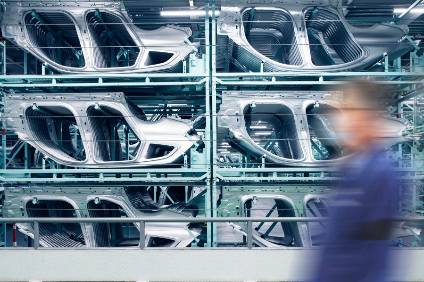
The BMW Group says it is investing in an innovative method – utilising electrolysis rather than traditional blast furnaces – for CO2-free steel production developed by US startup Boston Metal. BMW is using its venture capital fund, BMW i Ventures, to help the startup develop the process at industrial scale. It's another example of a vehicle maker looking deep into its supply chain – in this case important raw materials – to reach ever tighter sustainability goals.
Over the coming years, Boston Metal plans to expand the new method for steel production on an industrial scale. BMW says the investment is part of the BMW Group's far-reaching sustainability activities aimed at significantly reducing CO2 emissions across the supplier network.

Discover B2B Marketing That Performs
Combine business intelligence and editorial excellence to reach engaged professionals across 36 leading media platforms.
"We systematically identify the raw materials and components in our supplier network with the highest CO2 emissions from production. Steel is one of them, but it is vital to car production. For this reason, we have set ourselves the goal of continuously reducing CO2 emissions in the steel supply chain. By 2030, CO2 emissions should be about two million tonnes lower than today's figure," said Dr Andreas Wendt, member of the Board of Management of BMW AG responsible for Purchasing and Supplier Network.
Steel is one of the most important materials in car production, forming a vital part of the body structure on many vehicles. Materials such as plastic composites and aluminium can play a role, but even with the dynamic ramp-up of electromobility, steel will remain an important building material for car bodies and many components. BMW Group press plants in Europe process more than half a million tonnes of steel per year.
Using electrons instead of coal for steel production
The blast furnaces used in conventional steel production generate huge quantities of carbon dioxide. The startup Boston Metal uses electricity for its new technology, which, by means of an electrolysis cell, produces molten iron that is later processed into steel. If electricity from renewable energies is used for this process, then steel production is carbon-free.
Boston Metal says it is commercializing molten oxide electrolysis (MOE), a patented tonnage metals production platform. MOE provides the metals industry with a more efficient, lower cost, and greener solution for the production of a wide variety of metals and alloys from a wide variety of feedstocks, the company claims.
Boston Metal came out of a research project at the MIT. With support from NASA, the American Iron and Steel Institute, and the Deshpande Center at MIT, Professor Donald R. Sadoway's laboratory demonstrated that MOE could efficiently produce a broad platform of metals at laboratory-scale. To commercialize these innovations, Professor Antoine Allanore, Dr. Jim Yurko and Donald R. Sadoway founded Boston Electrometallurgical Corporation in 2012.
In 2013, in the journal Nature, Antoine Allanore, Lan Yin, and Donald R. Sadoway demonstrated that MOE could produce emissions-free steel with the publication of laboratory results using a cost-effective inert anode. The first semi-industrial MOE cell was commissioned shortly thereafter in 2014.
With additional funding from the US DoD Defense Logistics Agency, Department of Energy, and National Science Foundation the company, renamed as Boston Metal, has continued to innovate and is now bringing the MOE technology to market for ferro-alloys, steel, and a variety of other metals.
Boston Metal will build demonstration facilities for the MOE process over the next few years and further develop it for use on an industrial scale.
Boston Metal will build demonstration facilities for this process over the next few years and further develop it for use on an industrial scale, BMW says.
The BMW Group has been in contact with Boston Metal in the context of its own research activities and through the 'BMW Startup Garage'. The company is now investing in the startup as part of its i Ventures activities.
Tadeu Carneiro, Chairman and CEO of Boston Metal, said: "Our investors span across the steel value chain, from the upstream mining and iron ore companies to the downstream end customer, and validate Boston Metal's innovative process to produce high-quality steel, cost-competitively, and at scale."
Innovative technologies and use of green power in steel production
Investing in new technologies is one of many steps the BMW Group says it is taking to meet its targets for the steel supply chain. For example, low-carbon production is an important award criterion for every contract, it says.
"It is important to us that our partners are firmly committed to sustainable action and use production technologies with low -carbon emissions," added Wendt. "The use of green power also has a major impact. We are already working with suppliers who use only green power for the steel they produce for us."
Closed-loop material cycle and increased use of recycled steel
To safeguard reserves of raw materials, the BMW Group has set itself the goal of further increasing its percentage of recycled raw materials, so-called secondary material, by 2030 and using raw materials multiple times in a circular economy.
All steel waste produced at the press plants – for example, when doors are punched out – is either reused through a direct material cycle or sent back to the steel producer via steel traders and processed into new steel. The use of secondary material reduces CO2 emissions substantially compared to primary material, conserves natural resources and also reduces the amount of energy needed for production.
Commitment to environmental and social standards in the value chain
As part of its involvement with ResponsibleSteel, the BMW Group participated in development of a sustainability standard that covers environmental and social standards throughout the entire value chain, starting at the mine. The sustainability standard for production sites in the steel industry was published in 2019 as part of a multi-stakeholder process and now forms the basis for certification.
Not-for-profit ResponsibleSteel is the steel industry's first global multi-stakeholder standard and certification initiative.
See also: Half Daimler suppliers commit to carbon neutral






